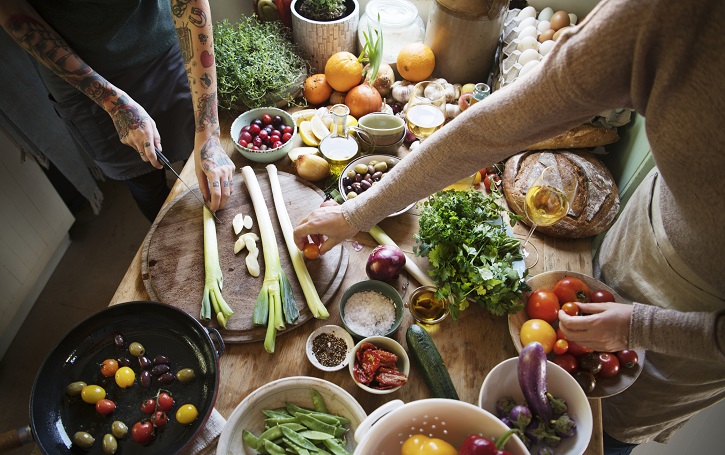Anne-Marie Minihane is Professor of Nutrigenetics and Head of the Department of Nutrition and Preventive Medicine in Norwich Medical School. She writes about a ground-breaking study she’s involved in at UEA and gives her advice on staying nutritionally healthy during these #wfh days.

Since the COVID-19 crisis began we have been continuing as best we can with our research programme in nutrition, cognition and Alzheimer’s disease risk, and doing a lot of writing of research papers and grant applications. We were aware that there is no previous data available that would be able to predict the likely impact of social isolation and distancing measures on our behaviour. So a team of us (led by Dr Caitlin Notley, with Dr Amy Jennings, Latife Esgunoglu (PhD student) and myself from the Nutrition Group) are collaborating in a study called the COVID19 Wellbeing Tracker Study.
The project is following people’s health behaviours – particularly eating, smoking, physical activity, alcohol consumption, drug use and sleep – as well as wellbeing during social isolation and lockdown. We predict that, for many people, social distancing will have quite a negative effect and will impact on our day-to-day and long-term health.
But in the short term, I believe there are some simple ways we can all increase our self-awareness with our eating and take positive steps to improve our nutrition and behaviours during this time. Here are some top tips:
Notice your habits You may be slipping into unhealthy habits. Lack of planning and wandering into the kitchen to eat whatever is easiest are common pitfalls, as well as choosing foods with high sugar, fat and salt content. The important thing is not to be too hard on yourself, just be self-aware.
…And then switch them up When you find yourself wandering towards the kitchen and the fridge, ask yourself if you are hungry or whether you are anxious, feeling a little low, or in fact thirsty? Hydration is really important. We should drink about 1.5 litres of fluids per day.
But keep an eye on your alcohol consumption The NHS advises we should not be regularly drinking more than 14 units per week. That’s a bottle and a half of wine or five pints of lager (5% abv) over the course of a week – and it applies to both men and women. There is useful info on the Drinkaware website.
Make food fun! This is a highly emotional time, so aim to positively frame food and cooking, making it fun and a source of entertainment. Why not aim to cook at least one new recipe per week? Cook as a family if you live with others or, if you don’t, have a ZOOM meal with family and friends – and each cook the same recipe.
Keep a tab – it’s useful. Write down what you eat over a day or two and look back over it, just to get a feel for your eating practices. And try out some novel, healthier snacks and see what you like most. I never tire of a bowl of wholegrain cereal with semi-skimmed milk.
Be flexible Shopping is a little more challenging at the moment, with some things unavailable. But remember for many foods non-fresh varieties can be just as good. It’s recommended to eat five portions of fruit and vegetables a day and fresh, frozen, canned, dried and juiced fruit and vegetables all count.
Nutritious is a treat! This may be obvious, but try to maximise your consumption of foods with lots of vitamins, minerals and other food bioactives (such as flavonoids). These micronutrients are good for the immune system, which may help reduce the severity of COVID-19 if you catch it.
And try to avoid consuming too many high sugar drinks, sweets, chocolates, cakes, biscuits, jams, ice cream… These foods are easy to overeat and not good for your overall metabolism, cardiovascular health or brain health. At a time when we are all under unprecedented stress we could really do without the poor physical and mental health that these ‘comfort’ foods are proven to contribute towards. Treat your body with nutritious food and your mind will thank you for it.
Finally - start the day well Choose a good breakfast to set you up for the day and eat it nice and slowly. Perhaps choose porridge with fruit or a wholegrain cereal. A good breakfast cereal will have less than eight grams of sugar per serving and more than four grams of fibre per serving. Make time for your healthy breakfast each day and you’ll be surprised how the rest falls into place.
If you would like to view any useful nutrition resources, I can recommend the following: British Nutrition Foundation, NHS Eatwell and Harvard School of Public Health.

:focus(1919x1749:1920x1750))